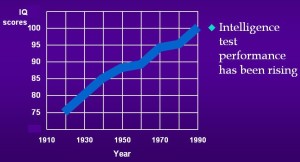
(source)
As is now well-known, scores on “intelligence” tests rose strongly over the last few generations, world-wide – this is the “Flynn Effect.” One striking anomaly, however, appears in American data: slumping students’ scores on academic achievement tests like the SAT. Notes of the decline starting in the 1960s sparked a lot of concern and hand-wringing. A similar decline is evident among adult respondents to the General Social Survey. The GSS gives interviewees a 10-item, multiple choice vocabulary test. (Practically speaking, vocabulary tests yield pretty much the same results as intelligence tests.) In over 40 years of the survey, a pattern emerged: Correct scores rose from the generations born around 1900 to the generations born around 1950 and then dropped afterwards. Are recently-born cohorts dumber – or, at least, less literate – than their parents and grandparents?
A new study presented to the American Sociological Association in August [published version, 2016, here] by Shawn Dorius (Iowa State), Duane Alwin (Penn. State), and Juliana Pacheco (U. of Iowa) tested a hunch several researchers have had about the generational pattern in the GSS vocabulary test – that words have histories.



